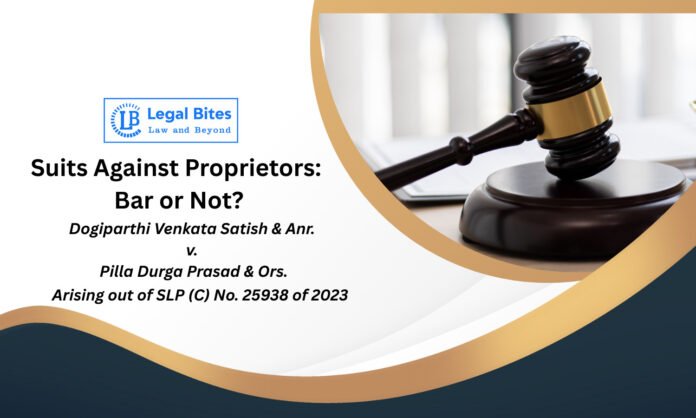[ad_1]
The legal position of proprietorship has often been a subject of confusion in Indian civil procedure. Unlike companies and partnership firms, a proprietorship has no separate juristic personality. This creates a recurring question: should a suit be filed against the proprietorship concern in its trade name, or directly against the proprietor?
The Supreme Court in its judgment dated 26 August 2025 in Dogiparthi Venkata Satish & Anr. v. Pilla Durga Prasad & Ors. clarified the interplay between Order XXX Rule 10 of the Code of Civil Procedure, 1908 (CPC) and the rights of litigants to sue proprietors. The ruling decisively settled that Order XXX Rule 10 CPC does not bar a suit against the proprietor himself.
Background of the Case
- The appellants were owners of a property leased to Aditya Motors, a sole proprietorship concern of respondent Pilla Durga Prasad.
- After expiry of the lease, the lessee failed to vacate, and a suit for eviction was filed.
- Later, the plaint was amended to substitute Aditya Motors with Pilla Durga Prasad directly, since he was its sole proprietor.
- The defendant moved for rejection of the plaint under Order VII Rule 11 CPC, arguing that the cause of action was against Aditya Motors, not against him personally.
- The High Court accepted this plea, relying on Order XXX Rule 10 CPC, holding that the suit should have been against the proprietorship concern in its trade name.
The matter reached the Supreme Court, which corrected this interpretation.
Understanding Order XXX Rule 10 CPC
Order XXX CPC primarily deals with suits by or against firms. Rule 10 extends some of these provisions to proprietorship concerns. The text reads:
“Any person carrying on business in a name or style other than his own name … may be sued in such name or style as if it were a firm name, and, in so far as the nature of such case permits, all rules under this Order shall apply accordingly.”
Key Takeaways
- It permits that a proprietorship concern may be sued in its trade name.
- It does not mandate that a suit can be brought only against the trade name.
- The real party in interest is always the proprietor, not the concern.
Supreme Court’s Ruling
The Court, speaking through Justice Vikram Nath and Justice Sandeep Mehta, held:
- Proprietorship is not a juristic person – It is merely a trade name adopted by an individual. It cannot sue, though it may be sued under Order XXX Rule 10 CPC.
- Proprietor remains the real party – Suing the proprietor directly is sufficient, as he alone represents the business. Once impleaded, the interests of the proprietorship are fully protected.
- No bar under Order XXX Rule 10 CPC – The word “can” in the provision is enabling, not restrictive. It allows suing in the trade name but does not prevent direct action against the proprietor.
- High Court’s error – The High Court’s interpretation was held to be hyper-technical and contrary to settled law. Since the lease deed was signed by the proprietor, the cause of action was clearly against him.
Highlights of the Decision
Justice Vikram Nath and Justice Sandeep Mehta observed:
The use of the word can in Order XXX Rule 10 CPC only indicates that proprietorship concern may be made a party. However, it does not necessarily mean that the proprietor itself if made a party would not be enough, inasmuch as, the proprietorship is to be defended by the proprietor only and not by anybody else. Once the proprietor has been impleaded as a party representing the proprietorship, no prejudice is caused to rather its interest is well protected and taken care of by the only and only person, who owns the proprietorship. Order XXX Rule 10 CPC does not in any manner debar a suit being filed against the proprietor.
Reliance on Precedents
The Court reaffirmed earlier rulings:
- Ashok Transport Agency v. Awadhesh Kumar (1998) 5 SCC 567: A proprietary concern is only a business name; the proprietor is the real party in interest. Rule 10 is enabling, not converting it into a firm
- Shankar Finance & Investments v. State of Andhra Pradesh (2008) 8 SCC 536: In proceedings involving proprietorships, the representation may be in the trade name or through an agent, but the proprietor remains the person legally liable.
Practical Implications
- Flexibility in Pleadings: Litigants may file suits either against the trade name (Aditya Motors) or directly against the proprietor (Pilla Durga Prasad). Both are legally valid.
- No Prejudice in Substitution: Substituting the trade name with the proprietor does not affect the cause of action, since the proprietor is always the real party.
- Proprietor’s Liability: Proprietors cannot shield themselves behind the trade name; their personal liability remains absolute.
Conclusion
The Supreme Court has clarified that Order XXX Rule 10 CPC does not restrict suits against proprietors. It merely allows an additional procedural route to sue in the trade name of the proprietorship concern.
Thus, whether a plaint is filed against M/s Aditya Motors or directly against Pilla Durga Prasad, it is essentially the same. The proprietor is the person responsible, and his presence in the suit satisfies all procedural requirements.
This judgment reinforces the principle that law should not elevate form over substance. What matters is whether the correct person—the proprietor—is before the court, not whether his business alias has been used in the pleadings.
Important Link
Law Library: Notes and Study Material for LLB, LLM, Judiciary, and Entrance Exams
[ad_2]
Source link

